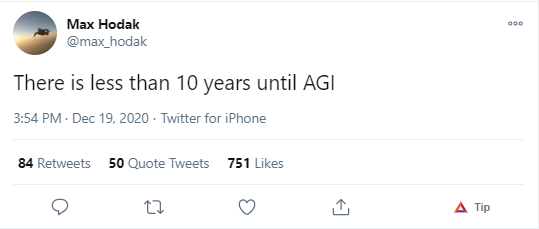Neurolink: AGI Less Than 10 Years Away?
Artificial Intelligence is something that has some people nervous. What is going to happen in the future? Are we moving towards our own extinction?
Many of the world's best minds like Elon Musk and Stephen Hawking have forewarned about the dangers that are posed to humanity by the threat of AI.
Musk felt so strong that he started Neuralink. The primary purpose was to develop a brain-to-computer interface (BCI). This is following the belief that humanity's best bet is to merge with the AI that is created.
Another question is how long do we really have? In other words, how far away is this?
Max Hodak, one of the co-founders of Neuralink, sent out this tweet:

https://twitter.com/max_hodak/status/1340400226687832065
This kicked off quite a discussion on Twitter as anyone who follows the space can imagine. It is a highly subjective topic and one without a clear answer.
Before going any further, we might want to clarify some definitions. Not all AI is the same.
Here are some basic terminology:
ANI: Artificial Narrow Intelligence-this is the AI of today. It is AI that is narrow in the scope of what it can do. For example, AI that is used to run an assembly line cannot tell the difference between a horse and an accountant.
AGI: Artificial General Intelligence-loosely defined, an AI system that cannot really be distinguished from humans.
ASI: Artificial Super Intelligence-the next step after AGI whereby the system gets exponentially smarter with each passing moment; so fast that we cannot predict what will even happen.
Experts claim we are a long way from AGI. In fact, many believe we are decades away from this even being a possibility. There is a large percentage that believe AGI might never be achieved, just wishful thinking.
So what makes Hodak different?
It is hard to say. There is no way to know if this tweet is being sarcastic or not. One of the questions that follows up is, if this is achieved in 10 years, would we even be aware of it? It is possible we reach AGI and have no idea we did it.
There is a school of AI experts who believe that AGI is already here. In other words, we do not have to create AGI as much as discover it.
Of course, the debate will not end for another 10 years. Then we will know whether this project is accurate or not.
Part of the problem with those who do not believe it possible is they are looking at the situation based upon what is known today. The tools of now are going to be much different in 5 years. What is impossible now could be feasible with the knowledge and abilities in half a decade.
As with most things, we do not know how close or far away we are until we get there. For example, did the Wright Brothers know they were three years away from flight when they were at that point? Did they believe they were 3 years away a year before they took flight?
That said, it is hard to see us getting anywhere near AGI in the next decade. Sure, AI has advanced a great deal in the last 10 years. However, there is still a ton we do not know about the brain, intelligence, or consciousness. In fact, we are at the very early stages.
Proponents of rapid AGI state that we do not need to know everything to achieve the end result. There is also the question of processing. The present method of AI training requires a lot of data along with processing power. To get close to AGI, it is likely that we will have to grow both of those exponentially.
The question is will we even be close to that point in a decade?
As we can see, there are more questions than there are answers. What happens when we get to the point of AGI? This is just a subject of speculation since nobody knows for sure. Will AGI look at us the same way as we do with other "intelligent" beings? For example, will AGI believe we are akin to snails or slugs, knowing we exist but not having much use for us on a regular basis?
Obviously, the hope of many is that if we can create a BCI, then any advancement in this arena will benefit humans to. If we are connected to the AI, any progress it makes will be part of us.
According to Hodak, we might be about a decade away from being super-intelligent beings ourselves.
Check back in a decade to see where we stand.
If you found this article informative, please give an upvote and rehive.

gif by @doze

logo by @st8z
Posted Using LeoFinance Beta
https://twitter.com/taskmaster4450/status/1341919221480099843
The power of artificial intelligence is extremely surprising. I am fascinated by this type of subject.
Posted Using LeoFinance Beta
I don't have a problem with AI as long as it doesn't make more people jobless.
We should adopt AI only when we know there is labour deficit or when we know the human resource a country has is more than capable to adopt to the new technology and earn a living ( in other words , better education )
Posted Using LeoFinance Beta
It is very unlikely that computer science could imitate the human intellect or the human brain.
I say this because I believe that nothing is impossible.
If only that AGI or ASI technologies were really successful, I think people can live longer or without death.
Posted Using LeoFinance Beta
There is no match of the power of human brain.
Posted Using LeoFinance Beta
Artificial Intelligence is new-age technology and the best of it is yet to come. AI will make our life easy and smarter in various ways and it would be exciting to see the power of AI in the future.
Posted Using LeoFinance Beta